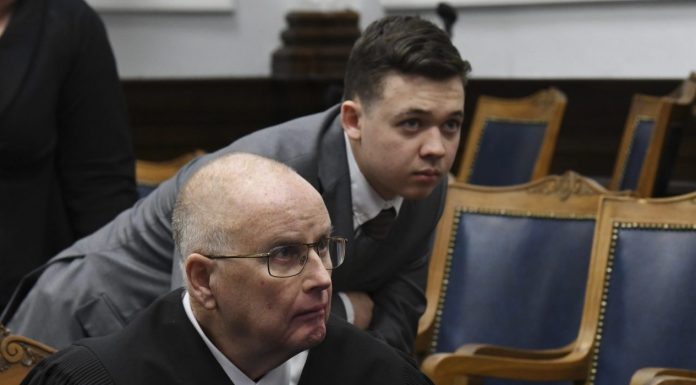(Headline USA) Attorneys were set to make closing arguments Monday at Kyle Rittenhouse‘s trial in the shootings of three men during Antifa-led riots in Kenosha Wisconsin, the last word before a jury begins deliberating in a case that underscored Americans’ bitter divisions on issues of guns, protests and policing.
Rittenhouse, 18, of Antioch, Illinois, faces charges ranging from intentional homicide—punishable by life in prison—to an underage weapons charge that could mean a few months in jail if convicted.
Rittenhouse, 17 at the time, traveled the few miles from his home across the state border to Kenosha on Aug. 25, 2020, as the city was in the throes of damaging protests that followed a the police shooting of a knife-wielding domestic abuser, Jacob Blake, while he was resisting arraest.
Bystander video captured the critical minutes when Rittenhouse, with a Smith and Wesson AR-style semiautomatic rifle, shot and killed two white assailants—Joseph Rosenbaum, 36, and Anthony Huber, 26—and wounded another, Gaige Grosskreutz, 27l as he aimed his weapon at the teen.
Rittenhouse has argued self-defense in the shootings, leaving prosecutors with the burden of proving that his fear for his safety and his use of deadly force were unreasonable. Some legal experts watching the trial said the prosecution struggled to do so.
Perhaps in recognition of that, prosecutors asked Judge Bruce Schroeder to let the jury consider several lesser charges if they acquit on the original counts. Schroeder indicated on Friday that he would allow some of what prosecutors sought when he gave the jury instructions on Monday.
Prosecutors, led by Kenosha County Assistant District Attorney Thomas Binger, sought to portray Rittenhouse as the aggressor the night of the shootings. Binger also highlighted Rittenhouse’s youth and inexperience, noting to jurors that of all the people armed in Kenosha that night, only Rittenhouse shot people.
But key witnesses seemed to strengthen Rittenhouse’s self-defense claims.
Videographer Richie McGinniss testified that Rosenbaum chased Rittenhouse and lunged for his rifle right before Rittenhouse shot him. Ryan Balch, a military veteran in Rittenhouse’s group that night, testified that Rosenbaum threatened to kill Rittenhouse and others if he got them alone.
Grosskreutz, the only man shot who survived, acknowledged that he had a gun in his hand as he approached Rittenhouse and that it was pointed at him.
Among the trial’s most compelling moments was Rittenhouse’s own testimony. In some six hours on the stand—most of it poised and matter-of-fact—he said he was afraid Rosenbaum would take his gun and shoot both him and others. He said he never wanted to kill anyone.
“I didn’t do anything wrong. I defended myself,” Rittenhouse said.
With prosecutors trying to focus jurors on the totality of what Rittenhouse did, starting with his decision to come to Kenosha with a gun, the defense tried to steer them toward the roughly 3 minutes that began with Rosenbaum’s pursuit of Rittenhouse—the period at the heart of his self-defense claim.
After closing arguments, names were to be drawn to determine which 12 of the 18 jurors who heard testimony will deliberate.
With a verdict near, Gov. Tony Evers said that 500 National Guard members would be prepared for duty in Kenosha if local law enforcement requested them.
Adapted from reporting by the Associated Press

